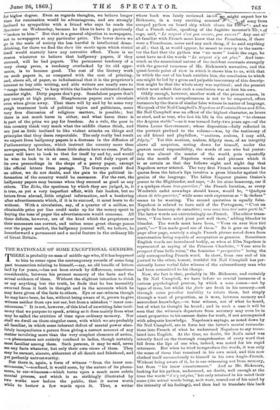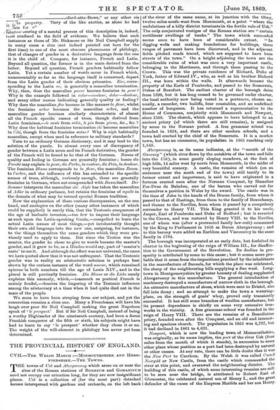THE RATIONALE OF SOME EXCEPTIONAL GENDERS.
THERE is probably no man of middle age who, if it has happened
to him to come upon the contemporary records of some long past transaction relating to himself,—say, an old bundle of letters laid by for years,—has not been struck by differences, sometimes eonsiderable, between his present memory of the facts and the actual evidence of them. Without the slightest intention to think or say anything but the truth, he finds that he has insensibly awerved from it both in thought and in the accounts which he may have given of the facts to others. Eye or ear-witness though he may have been, he has, without being aware of it, grown to give witness neither from eye nor ear, but from a mistaken "inner con.sciousness." It is not, however, of this kind of unwitting false testimony that we purpose to speak, arising as it does mainly from what may be called the attrition of time upon ordinary memory. Nor shall we dwell on those singular cases, with which we are probably all familiar, in which some inherent defect of mental power absolutely incapacitates a person from giving a correct account of any matter involving more than the very simplest elements of action, —a phenomenon not entirely confined to ladies, though certainly meet familiar among them. Such persons, it may be said, never see any facts whatever, but only their own views of them. They may be earnest, sincere, abhorrent of all deceit and falsehood, and yet perfectly untrustworthy. But there is, again, a form of witness "from the inner consciousness,"--confined, it would seem, by the nature of its phenomena, to ear-witnesses—which turns upon a much more subtle mental process, and which is so strikingly illustrated by two works now before the public, that it seems worth While to bestow a few words upon it. Thus, a writer
whose book was lately reviewed inr-fIrjAsmight expect her to Bickmore, in a very exciting aceoullet song from escaped python on board ship which closes his OW.40-.., and we that a French sailor, speaking of the fugitive mouster'i TIE% t of cage, said, "Le serpent West pas encore, pas encore!" Any one all familiar with French must know that the Frenchman, if there were a Frenchman, never said any such thing, if he said anything at all ; that if„ as would appear, he meant to convey to the narrator the fact that the python was "no more" inside the cage, he must have used the words "Le serpent n'y est plus." And inasmuch as the sensational nature of the incident contrasts strangely with the general tameness of Mr. Bickmore's narrative, and the quasi-heroic point of view in which it shows him to us, with that in which the rest of his book exhibits him, the conclusion to which one might be led by a gross and palpable inaccuracy of this description might be that the whole story was mythical ; and the present writer must admit that such a conclusion was at first his own.
Oddly enough, however, another work of the present season, in which the author's scrupulousness is not to be suspected, offers instances by the dozen of similar false witness in matter of language. We speak of Sir Neil Campbell's Napoleon at Fontainebleau and Elba. Sir Neil Campbell was an officer of the highest character, as brave as steel, and as true, who lost his life in the attempt "to cleanse the Augean stable"—as it was termed forty-two years ago—of the Sierra Leone Government ; whose disposition—fully reflected in the portrait prefixed to the volume—was, by the testimony of an old friend and playfellow, "anxious, zealous, I may add, fidgety." Yet this anxious, zealous, fidgety man, of an integrity above all suspicion, noting down for himself, under the gravest moral responsibility, the words of one who but yesterday was almost the master of the world, puts repeatedly into the mouth of Napoleon words and phrases which it is as certain as that day follows night and night day that Napoleon never uttered. The very first French sentence that he quotes from the latter's lips involves a gross blunder against the genius of the language. The fallen Emperor praises Ossian's poems to the Highlander, and says, " Je lea aime beaucoup, car il y a quelque chose tres-guerriere ;" the French locution, as every Woolwich cadet nowadays should know, would be, " Quelque chose de tres-guerrier," while some such expression as " lk-dedans " seems to be wanting. The second quotation is equally false. Napoleon is related to have said of the Portuguese, " C'est un peuple de beaucoup de caractere ; vous aver bias tin i votre parti M." The latter words are excruciatingly un-French. The editor translates, "You have acted your part well there," adding blunder to blunder. The words must have been, " Vous en avez bien tir6 parti,"—" You made good use of them." So it goes on through page after page, scarcely a single French phrase noted down from conversation being capable of acceptation as genuine. Sometimes English words are introduced bodily, as when at Elba Napoleon is represented as saying of the Princess Charlotte, " Vous aver le prospect d'ime belle reine," the feminine "perspective" being the only corresponding French word. In short, from one end of his journal to the other, honest, truthful Sir Neil Campbell has persistently borne verbal false witness of the extraordinary man who had been committed to his charge.
Now, the fact is that, probably in Mr. Bickmore, and certainly in Sir Neil Campbell, we have before us crucial instances of a curious psychological process, by which a man comes—not by lapse of time, but whilst the facts are fresh in his memory—not through some peculiar inability to retain them, but simply through a want of proportion, as it were, between memory and antecedent knowledge,—to bear witness, not of what he heard, but of what he thought he heard ; and in such a case it will be seen that the witness's departure from accuracy may even be in exact proportion to his earnest desire for truth, if not accompanied with adequate knowledge. Napoleon's sayings, as noted down by Sir Neil Campbell, are in form but the latter's mental retranslations into French of what he understood Napoleon to say translated into English. At the time, no doubt, Sir Neil's mind was intently fixed on the thorough comprehension of every word that fell from the lips of one who, indeed, was noted for his rapid utterance. But when he tried to reproduce the words, it was only the sense of them that remained in his own mind, and this now clothed itself unconsciously to himself in his own Anglo-French. Without being aware of it, he is ear-witnessing not from memory, but from "his inner consciousness." And so Mr. Biekmore, looking for his python, understood, no doubt, well enough at the time the words" il n'y eat plus," but only retained in his mind their sense (the actual words being, as it were, scared out of his mind by the intensity of his feelings), and then had to translate this back 750 .....tford-atte-Bowe," or any other cis
te property. Tlery of the like exotics, as alone he bad it
...Inta for Si" relaticte-oearing of a mental process of this description is, indeed, i..rot confined to the field of evidence. We believe that such instances as those of Mr. Bickmore or Sir Neil Campbell supply in many cases a clue (not indeed pointed out here for the first time) to one of the most obscure phenomena of philology, that of changes of gender in a derivative language from the one it is the child of. Compare, for instance, French and Latin. Beyond all question, the former is in the main derived from the latter. Beyond all question, French genders habitually follow Latin. Yet a certain number of words occur in French which, unaccountably so far as the language itself is concerned, depart from the Latin gender of their obvious primaries. Eur, corresponding to the Latin or, is generally a masculine termination. Why, then, does the masculine paror become feminine in peur Why is the example followed in color—couleur, dolor—douleur, and many other names indicating generally quality or feeling? Why does the masculine fibs become in like manner in ileur, whilst the feminine arbor becomes the masculine arbre, and the masculine gender becomes similarly characteristic of almost all the French specific names of trees, though derived from Latin feminines,—le saule from salix, le pin from pinus, &c., &c.? Why does the habitual feminine termination Re become masculine in though from the feminine wstas 7 Why is aigle habitually masculine, except when used in reference to military standards?
Turn to an ordinary German dictionary, and it may lead to the solution of the puzzle. In almost every case of discrepancy of gender between a Latin noun and its French derivative, the gender of the French will be found to be that of the German. Nouns of quality and feeling in German are generally feminine ; hence die Furcht may explain in peur, die Farbe, in couleur, die Pein, in douleur. The feminine Blume corresponds to la fleur, the masculine Baum. to l'arbre, and the influence of this has extended to the specific names of trees, although, curiously enough, these are generally feminine in German, when not compounded with Baum itself. Der Sommer interprets the masculine ed. Aigle has taken the masculine of Adler in ordinary parlance, but retains the feminine of aguila in the domain of what may be termed special Roman tradition.
Now the explanation of these curious discrepancies, on the one hand, and analogies on the other (many other instances of which could be supplied) is surely this, that the Teutonic conquerors of the age of barbaric invasion,—too few to impose their language as such upon the Latin-speaking Gauls,—compelled to learn the actual Latin names of most things,—yet involuntarily thought their own old language into the new one, assigning, for instance, to the things themselves the same genders which they were previously used to apply to them. But since the Teuton was the master, the gender he chose to give to words became the master's gender, and it grew to be, as a Hindoo would say, part of master's caste' to use it. And although the effect was not universal, the cases we have quoted show that it was not unfrequent. That the Teutonic gender was in reality an aristocratic solecism is perhaps best shown by the curious instance of the word amour, which remained epicene in both numbers till the age of Louis XIV., and in the plural is still poetically feminine. Die Illinne or die Liebe surely explains this anomaly, which,—inasmuch as poetical French is mainly feudal,—denotes the lingering of the Teutonic influence among the aristocracy at a time when it had quite died out in the mass of the people.
We seem to have been straying from our subject, and yet the connection remains a close one. Many a Frenchman will have his laugh over poor Sir Neil Campbell making the great Napoleon speak of ' le prospect.' But if Sir Neil Campbell, instead of being a worthy Highlander of the nineteenth century, had been a fierce Frankish conqueror of the fifth or sixth, his subjects might have had to learn to say 'le prospect' whether they chose it or no. The weight of the will-element in philology has never yet been determined.































 Previous page
Previous page